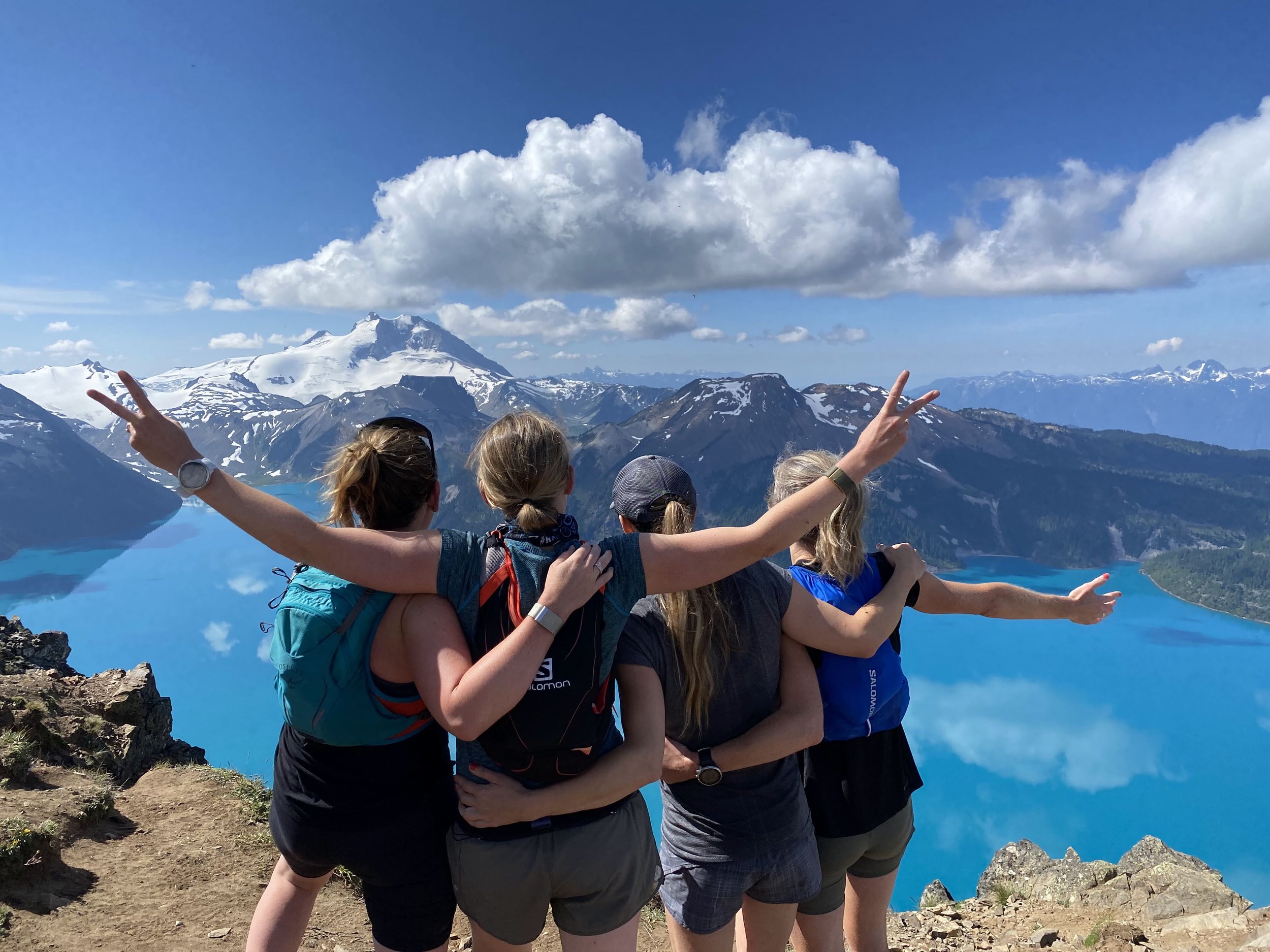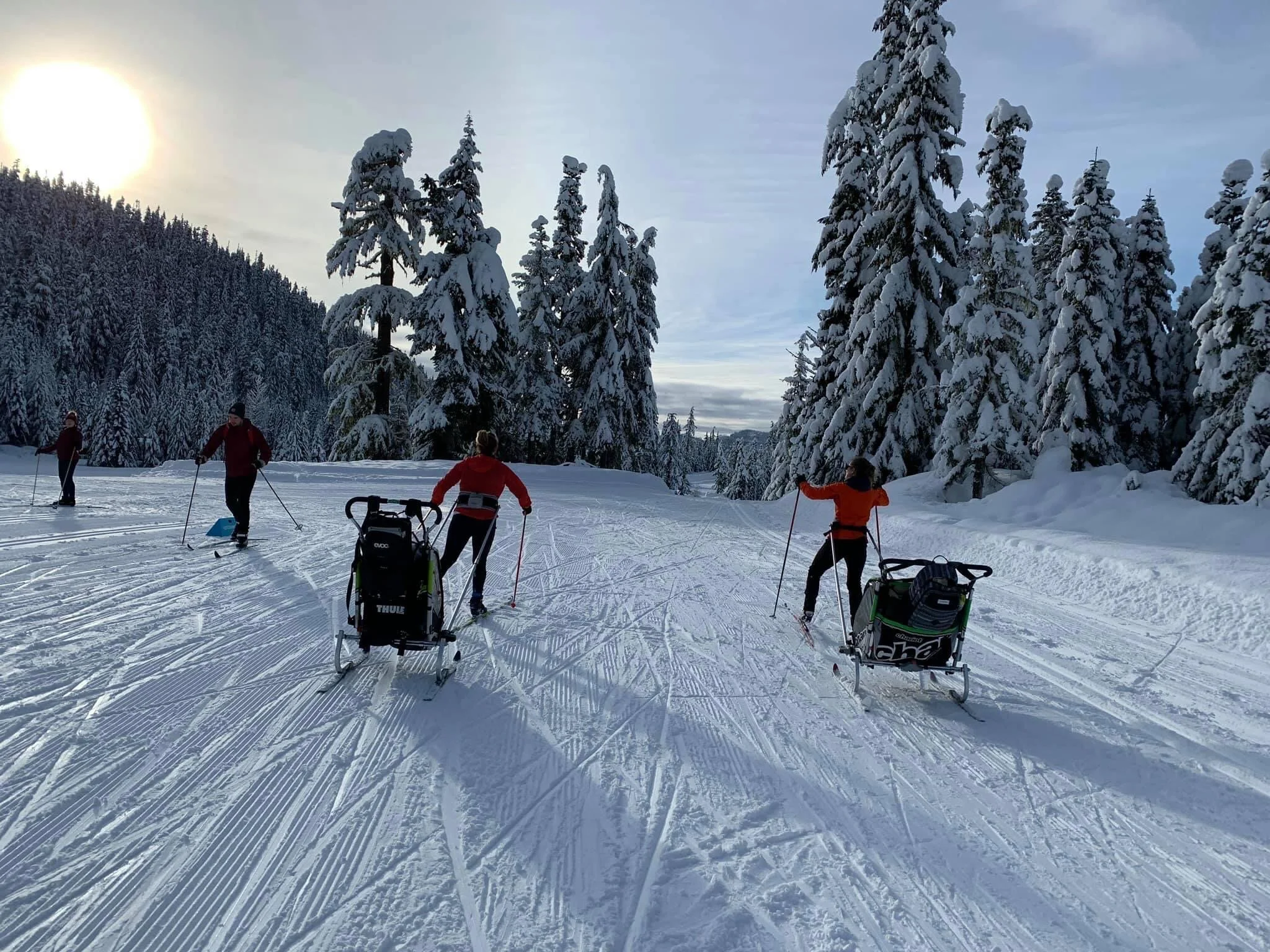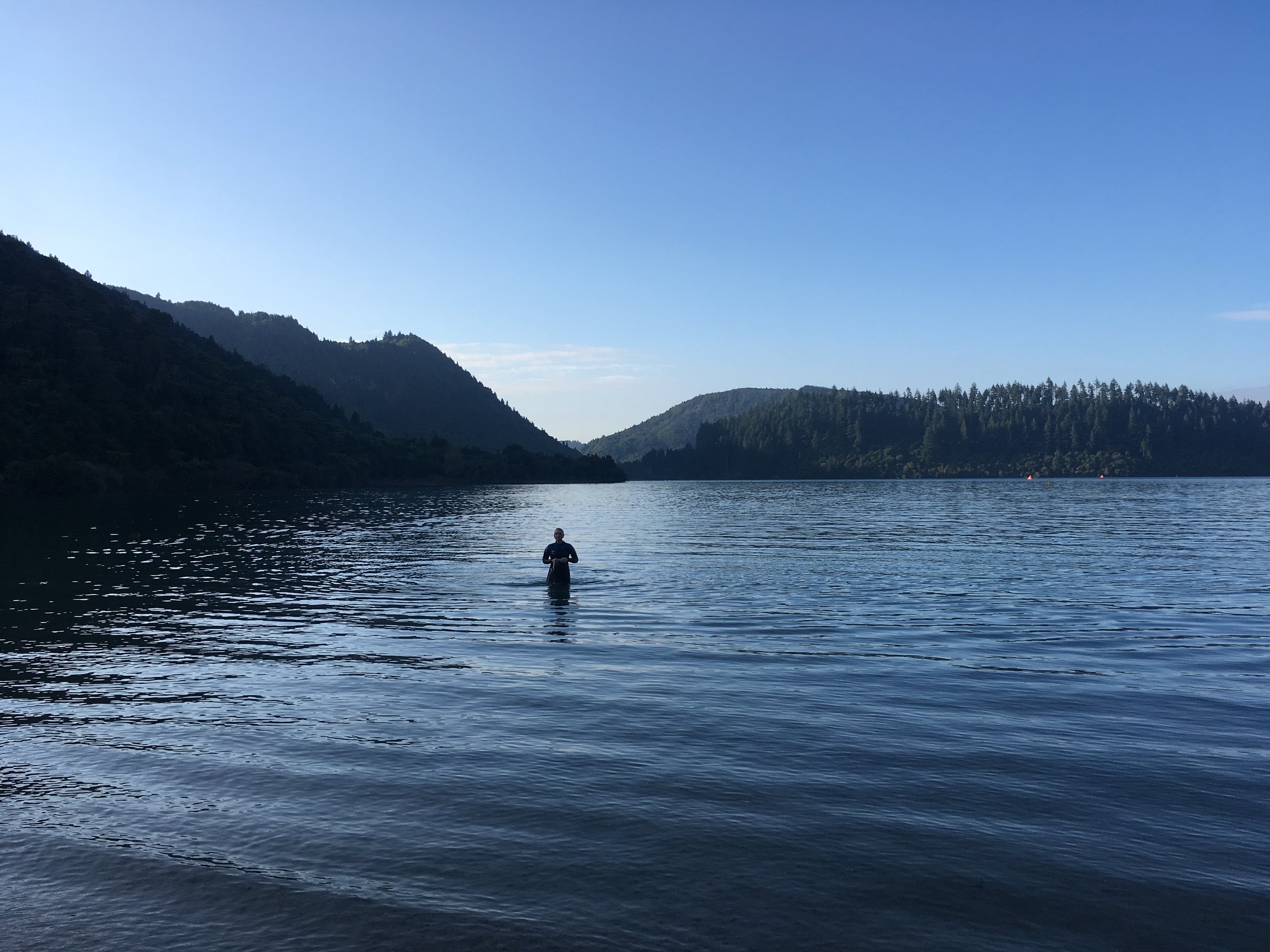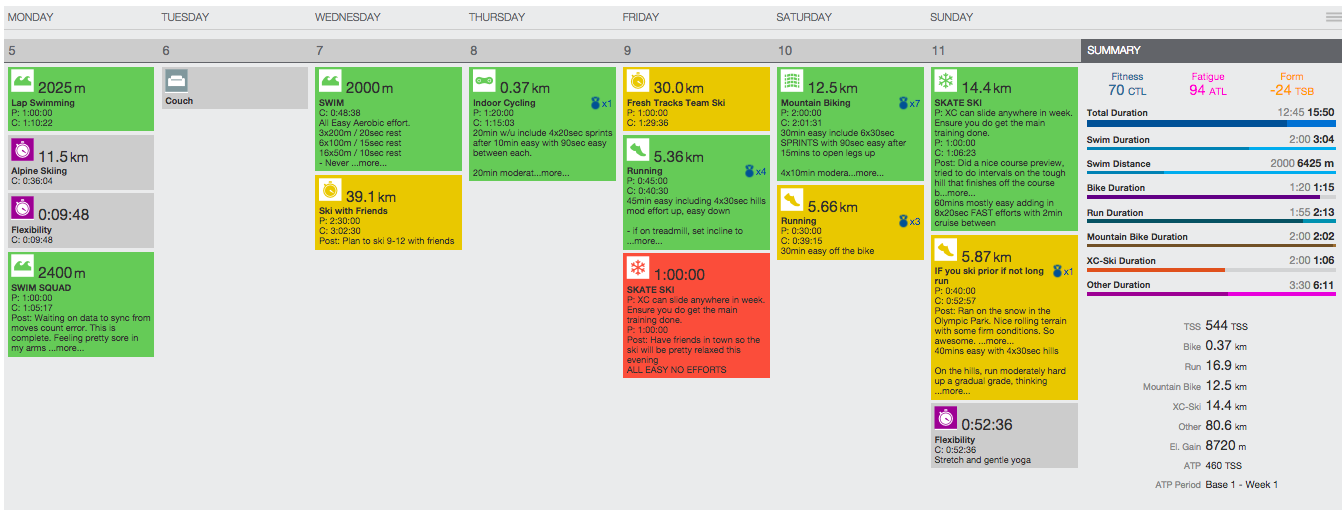
Finding My Why On The Road
Looking back on some of the beauty and humour of training for an off-road triathlon and Ironman 703. while traveling with the Crankworx World Tour.
It was the eve of Whistler’s Ironman Canada event but I wasn’t dealing with pre-race butterflies or preparation stress. Rather, I was more concerned with if we’d brought enough food for an evening picnic. Lingering with a few friends after dinner the topic switched to triathlon. “Think of all those people that put their heart and soul into training and have a mechanical or can’t finish their race."
"What a waste," a friend said.
Another countered that it can’t be about the race day outcome. Think about all the experiences along the way. He was so right on so many levels. To celebrate the process, here are a few things I’ll cherish from my first season training for both an off-road triathlon and Ironman 70.3 while traveling with the Crankworx World Tour.
1. Watching The World Wake Up and Fall Asleep During Training
Most people that train in open water quickly discover the incredible privilege of pausing to watch the early morning pastels light up the sky while swimming. It still gets me in Whistler's Alta lake, every time.
But on the road, a few more things tickled me. First, on stop one of the World Tour aka Crankworx Rotorua, one of the broadcast days ran long and a big training run was in my plan. Armed with a super bright bike light and a few podcasts I explored the trails of the Whakarewarewa Forest at night.
The air was warm and Rotorua's lights flickered in a reflection of a few dimly light stars. But it was all thriller, no filler once I hit the trails. Wallabies, bunnies, birds and possum-like critters rustled and scurried.
I nearly jumped out of my skin three or four times.
Mid-run I found myself in area lined with tall sprinklers. 250 meters into the rows of sprinklers I read a sign that said something along the lines of "warning refuse sprinklers". Horrified at the thought of getting in the line of fire of poop spray I lunged into a sprint and set a PR back the way I came. But I survived, with a few funny stories and ticked the workout complete at the end of the night.
The Innsbruck city streets leading to nearby mountain bike trails
On Stop two of the World Tour in Innsbruck, Austria I set out for a mountain bike ride at first light to make sure I was back in time for our team meeting. Rolling through the city streets, I encountered throngs of club-goers leaving bars. Couples kissing, bottles breaking and general debauchery was the vibe. It was hilarious. After checking out a good portion of the famed Arzler Alm Trail I retraced my route back to the hotel. Only about an hour's difference and joggers, commuters, and street sweepers replaced the partiers. Zero evidence of the previous night's party. It was as if they were never there. A hysterical and bizarre changing of the guard.
Views of Innsbruck from the trails
2. Becoming a Terrain Reading Ninja
Ok, I have to admit this one is still a work in progress. But while on tour, there's always a time crunch on triathlon training. There isn't much room for navigational errors out on the mountain bike or running trails. My dilemma, I love seeing new places and working out over a full loop or out and back track. At each stop, I spliced together the Strava segment explorer, Sunnto Heat Maps and TrailForks to do my best to make training more fun. To tick all the boxes and bag all the views.
Days before kicking off Crankworx Innsbruck we had a chance to trail run to this spectacular view in Leogang, Austria.
On the third stop of the World Tour in Les Gets, France I found a mint trail in the bike park to do hill climb intervals. Taking into account elevation gain, type of terrain and length of trail I worked out that I could make it to the top as I clocked in my final set.
Enjoying the views from the top of Les Gets Bike Park
The views from the summit are stunning. As a treat, I picked what looked like a gentle blue trail to motor my short travel cross-country mountain bike down. I quickly realized that this mellow intermediate flow trail featured a number of gap jumps and proceeded to comically smash into the upside of one of the landings. Stans from my tubeless tire sprayed like a cinco de mayo sparkler all over me and the trail. My arm and ego sustained a bit of a bruise, but I was injury free. I often wonder if half of the adventures I set out on would have been achieved if I didn't have a goal race and training in the works.
3. Anxiety or Stress?
Elevated heart rate, hard work and discomfort. They're both characteristics of Anxiety and Stress. I've confused them so many times. What started out as a huge roadblock in my training became an innate connection with my body. I think back to the times I overheated on my trainer in the winter and gave up on my workout or felt like my heart was going to beat out of my chest on an interval outside. There was something instinctual telling me to back off or else I might self destruct.
Winter training on my snow covered balcony.
When I unpacked the concept I realized I wasn't going to self combust. If I needed rest, it was going to have to come from more sleep, better fuelling and recovery. Not from quitting when things got tough. When I eased off and pushed through challenging workouts I felt indescribably stronger than ever before. There wasn't a moment but rather a collection of times in Rotorua, Innsbruck, Whistler and Les Gets that I recognized the anxiety and converted it into good stress.
The result of harnessing good stress on a Blackcomb Mountain Trail Run with Liz
4. Endorphins as Treats
Lastly, the time spent playing outside of structured training is now a sacred reward. Bike Park laps in Innsbruck, Yoga in Rotorua and hiking in Les Gets filled up my cup of stoke. Each activity, served as beautiful rechargers for my body and mind. These unstructured adventures kept me sharp and beaming with gratitude.
I can't wait to build on these moments, feelings and learnings for 2019. What wonderful and wild way to see the world. Are you training while traveling? Leave a favourite story in the comments.
Three Pieces Of Advice That Keep Me Training Through The Winter
Digging deep for triathlon training inspiration when Whistler serves us stormy weather and cold spells.
This time last year I was training in short sleeves and sunscreen on the South Island of New Zealand. We had just wrapped up my longest trail run to date on the Nydia Track. My husband and I were fortunate enough to have two, back to back summer seasons. It was heavenly.
Trail running the Nydia Track with friends in New Zealand
Fast forward to now. My sessions happen under Whistler's winter skies or (if I must) indoors. I endure the wax and wane of downpours, fluffy snow flakes and enjoy the occasional clear day. Today the temperature hovers around a balmy -5C but that's life during the winter months in a Northern Hemisphere rainforest. To be honest, I love it.
Playing hide and seek on a powder day.
Unsurprisingly, training for summer-oriented races through winter is a challenge. To be ready for my 2018 race season of off and on-road triathlons I've added a new layer of structure into my life. It involves a change to my entire diet, sleep schedule and that of my husband's to support my goals (yeah, he's a Saint).
To add to the challenge, my coach and I are trying to find the happy medium of including unstructured winter activities, work stress, social life and an increasing training load. Even the soundest of dedication is occasionally shaken by the idea of endlessly staring at a wall on a spin bike, cutting a day on the mountain short or running in the dark.
Headlamp selfie.
Luckily, I've had some incredible advice from some pretty cool people. Some advice that has rocked my entire approach to winter training.
Yeah, that good.
Here are three things I've been using to dig deep:
1. Recently turned pro-triathlete, Steph Corker said in an interview that weather does not define if she trains. It only dictates what she wears. These words play in my head on repeat when it's dark and raining - but the job has to get done. I can't use weather as an excuse to keep me from getting sessions done. It's perfect Canadian inspiration!
You can listen to the entire podcast that she's featured in, here.
2. My husband gave me some invaluable training advice very early in our relationship. Put all of your gear/clothing on and then decide what comes next. You'll feel too ridiculous walking around the house with a helmet or running vest on to bail on a session. It's genius. I can attribute endless successfully completed mountain biking and swimming sessions to this sole piece of advice over the years.
What an incredible birthday gift! A spin trainer to put my race bike on. Many thanks to my Whistler girl tribe and stellar husband.
3. "Enjoy the process." My entire network of supporters from my coach, Kristian, to my family to blogs and podcasts all stress this as one of the most important rules of training. If I don't commit to taking in a deep breath and smiling when I catch the alpenglow bouncing around the Whistler valley at sunrise or embrace my inner warrior when I'm crunching through snowy trails in the dark - what's the point?
Yaktrax Pros paired with my Salomon Speedcross Trail Runners: The oh-so-stylish winter trail running set up.
It's challenging to distill all of the great pieces of advice and gear that bulldoze the excuses. There's always a compelling case to stay cozy in bed at 5 AM but when I look around at all the support I have, triathlon feels much more like a team sport. At the risk of sounding a tad sappy, the people around me are what keep me inspired to keep going.
Good luck in your winter training, go forth and achieve warrior status.
Here are a couple of resources for more details:
- Winter Triathlon Hacks
- Liv Cycling Blog's 6 Motivational Tips from Professional Triathlete Radka Vodickova
- Triathlete Mag's Plow Through: Cold-Weather Workouts
- Well Fit's Winter Motivation: Say Good Bye To The Blues
- Top 5 Jedi Mind Tricks for Motivation
Any other tips? Leave them in the comments below.
Skate Skiing: Lessons From Learning a New Sport
Sometimes I have to laugh at myself. My love for endurance sports runs so deep that sometimes it drives me to do strange things. Enter: Skate skiing.
The Olympic Venue for Nordic Skiing in Whistler (Whistler Olympic Park) hosts introductory night skiing once a week during the winter. As an instant Bambi on toothpicks.
Wobble. Fall. Skated a few strides. Repeate.
Did I show signs of potential greatness? Probably not. But I did discover a beautiful new way to explore on snow. Learning a new sport at 31 is surprisingly contagious, once you get past the nerdy get-up and skinny skis. But it's not something unique to skate skiing, the same challenge could be applied to any sport. Mentally, physically and emotionally it's a rad experience.
Here are 5 lessons that I’ve learned about picking up a new sport like skate skiing:
Have Patience
It was easy to be frustrated with my lack of balance or inability to perform simple actions like stopping on skate skis because of my background as an alpine skier. Go easy on yourself, and laugh it off - No one comes out of the gate as an expert, a new sport means that everyone starts from zero.
2. Take a Lesson/Coaching Session
I went out and tried skate skiing on my own quite a few times before I befriended our local Biathlon coach, Munny Munroe. If you’ve ever tried to teach a significant other to alpine ski then you know tips from friends only gets you so far in your learning progression (If you haven't take my word for it, bad plan). Munny is the man. He had me dial in my skate skiing technique and efficiency through drills, and equipment suggestions. Don't fumble around with bad technique for too long in a new sport, it's a waste.
3. Don’t be afraid to fall
Falling sucks. But if you approach a new sport like skate skiing with the fear of falling front of mind, you’ll never push your boundaries. You never know, you might surprise yourself.
5. Set Goals
Eventually, I nailed a few great strides in a row and the steep pitch that was once terrifying became a piece of cake. The more practice, the quicker that happened. I put in some endurance efforts (2 hrs +) cruising around the Whistler Olympic Park and Lost Lake plus added some fast paced interval sessions. I found my benchmark, complete a loppet aka Skate Ski Race. I was nervous about the mass start but the course was over some kick-ass terrain. I put in serious time practicing those 3-4 weeks prior to the race and found that once I could complete the distance the least I could do was give it a try!
Siggie's P'ayak did not disappoint! The course: Burning lungs, some slushy falls, a strategic pass or two and some big climbs. An hour later I was at the finish. Almost 30 minutes faster than my anticipated time. It was one of the most stunning races I’ve ever done in any sport. Worth it.
Lastly, recover as hard as you train:
My partner Dan gave me some wholesome advice that is changing the way I look at training for all sports. He questioned how I could spend so many hours training and not consider the holistic perspective of my well being: Nutrition timing and recovery. Just like any other endurance sport I planned out food pre, during and post skate skiing. I also bring a change of clothes with me because even though you work up a serious sweat on skate skis, your temperature drops significantly when you're done. Seriously, don't forget about this one.
Now go out and try something new. If nothing else, it makes for a good story, tired muscles and some funny photos.




























Looking for quick, scenic trail runs in the Sea to Sky? Explore five favourites near Whistler, Squamish and Pemberton featuring glacier lakes, alpine vistas and forest trails perfect for adventurous runners.